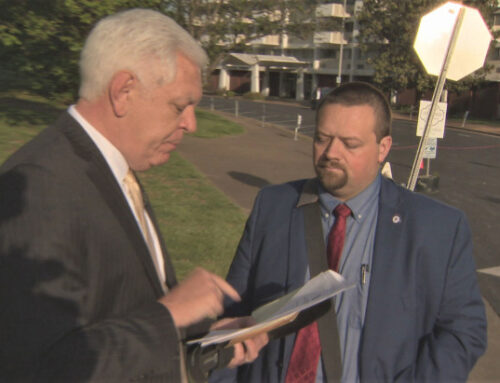For 2 1/2 years, the city of Memphis has sent journalist Marc Perrusquia perfunctory communications that it is still reviewing and considering his records request, each time pushing the date for its response down the road.
Perrusquia asked for the audits and evaluations of a Memphis police program that provides non-disciplinary intervention when police officers exhibit behavior and performance problems.
The city’s policy and procedure manual requires an audit of the program every six months to evaluate the outcomes of supervisory interventions and the quality of reviews. Quarterly reports are also required.
Perrusquia, a journalist in Memphis for more than 30 years, asked for five years of the audits and evaluations on Dec. 6, 2020. If an audit is done every six months in compliance with the city’s policy, that’s 10 audits. However, the city stonewalled his request, contacting him 41 times over the 2 1/2 years extending the “time necessary” to complete the request.
Remarkably, one time the city told Perrusquia that the responsive documents were with the city attorney for review. Then the next month, the city said that it had not yet determined that records responsive to his request existed.
Public records law limits delays
Now Perrusquia has filed a lawsuit against the city over the delays, saying they amount to a constructive denial of his public records request.
His attorney is Paul McAdoo with the Reporters Committee for Freedom of the Press. McAdoo represents journalists in Tennessee as part of the Reporters Committee Local Legal Initiative.
The public records law outlines how government entities are required to respond to a public records request in T.C.A. § 10-7-504 (a)(2)(B):
(B) The custodian of a public record or the custodian’s designee shall promptly make available for inspection any public record not specifically exempt from disclosure. In the event it is not practicable for the record to be promptly available for inspection, the custodian shall, within seven (7) business days:

Attorney Paul McAdoo is with the Reporters Committee for Freedom of the Press’s Local Legal Initiative
(i) Make the public record requested available to the requestor;
(ii) Deny the request in writing or by completing a records request response form developed by the office of open records counsel. The response shall include the basis for the denial; or
(iii) Furnish the requester in writing, or by completing a records request response form developed by the office of open records counsel, the time reasonably necessary to produce the record or information.
Perrusquia in his lawsuit says that the city’s “chronic delay is a violation of the TPRA’s requirement that non-exempt public records be made ‘promptly’ available to the requester.”
He also takes aim with the city’s multiple extensions of “the time reasonably necessary to produce the record or information.”
“The City’s repeated delays constitute a constructive denial of Mr. Perrusquia’s public records request,” the lawsuit says. “Mr. Perrusquia’s attempts to obtain these public records without filing a petition with this Court have been unsuccessful. It is therefore necessary to bring this action for access and judicial review pursuant to Tenn. Cod Ann § 10-7-505.”
Letters repeatedly delay response without clear explanation
The lawsuit aims at a problem that confounds many journalists and others in Tennessee who request public records: A government entity that gives a time estimate on when the records will be available, then keeps extending the time over and over. Or, as in Perrusquia’s case: A government that never gives a time estimate and just keeps sending a pro forma letter that it is still reviewing the request and it will let you know later.
In my work as TCOG’s executive director, I’ve often seen denial letters to journalists and citizens with this phrase: “The office is still in the process of retrieving, reviewing, and/or redacting the requested records,” with a note that the requester will hear back in another 30 days. The 30 days come, and the journalist gets the same response. Or they get no response, as if someone forgot to send out the letter again. On the outside, it feels like nothing is being done on your request for records and that maybe no one has even looked at it.
Memphis Business Journal documented city’s problems in 2019
The problem with delays has been acute in Memphis for years. In August 2019, the Memphis Business Journal produced an investigative report about the city’s responses to public records requests. It documented a request it made on Dec. 6, 2017. It was fulfilled a year later, but only after the editor of the newspaper was meeting with a high-level staffer about another matter and mentioned the delayed request. After he did, the staffer promised to look into it, and within three days the city fulfilled the request.
The city responded in the newspaper’s story, saying they initially thought they might have a staffing issue, either needing more people or more training of people. But later they told the newspaper that they had a better handle on the situation and had updated its policy from a first-in/first-out to a rolling request system. “Under the new process, rather than letting one request hold up the queue just because it was received first, custodians will try to fill the easy requests quickly and fill large requests in sections.” That was 2019.
No matter the processes employed by government entities, Perrusquia’s lawsuit may be the first in Tennessee that has taken aim at unusual and inexplicable delays.
Police audits could shed light on problems within police department
It’s notable that he is asking for records that go to the heart of questions about police oversight in Memphis. His request was made in December 2020. In January 2023, Tyre Nichols was pulled over by police for what they said was reckless driving, then beat to such a pulp that he later died. Much of it was caught on body camera and a street camera. The police officers directly involved have been relieved of duty.
The audits of the city’s police program that seeks to intervene in behavior problems of police should have been released quickly, back in 2021. What do they show? Perhaps this lawsuit will shake them loose and, at the same time, push back on the pattern of delays that undermine transparency in government.
The case has been assigned to Shelby County Chancellor Melanie Taylor Jefferson.




